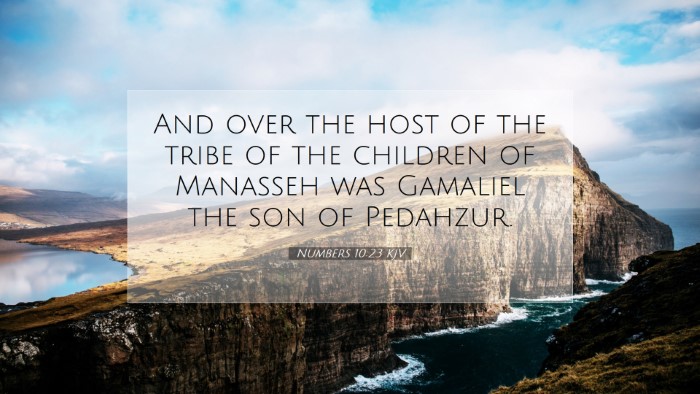Commentary on Numbers 10:23
Numbers 10:23 states:
"And over the host of the children of Ephraim was Elishama the son of Ammihud."
Contextual Overview
This verse forms part of a passage that outlines the organization of the Israelite camp during their wilderness journey. The great multitude of Israel was arranged in a strategic manner, with each tribe playing a vital role in their collective identity and formation.
Exegesis of Key Elements
The Tribe of Ephraim
The tribe of Ephraim holds a prominent position among the tribes of Israel. Matthew Henry remarks on Ephraim’s leadership, being the second son of Joseph, and highlights Ephraim's significant role due to Joseph’s elevated status in Egypt.
Albert Barnes notes that Ephraim became one of the leading tribes in Israel, particularly noted for its strength and military prowess. This elevates the importance of their representation in the encampment and the leadership of the tribe's appointed rulers.
Elishama's Role
Elishama, the son of Ammihud, is specifically mentioned as the leader over the host of the children of Ephraim. This indicates both a personal and tribal responsibility. Adam Clarke emphasizes Elishama’s role not only as a leader but as one accountable for the wellbeing and order of his people during their journey.
Theological Insights
This verse opens avenues for theological reflection on leadership and community organization in the context of God’s people. Through the example of Elishama, we see the biblical view of leadership rooted in service to others.
Henry suggests that leadership within the community of faith should encompass both spiritual and practical aspects, aligning with God's directives and serving the needs of the people.
Historical and Cultural Significance
The organization of tribes and their leaders in Numbers is not merely for logistical purposes; it reflects the covenant relationship between God and the Israelites. Leaders like Elishama were instrumental in executing God's plans in the terrestrial realm.
Practical Applications
Pastors and theologians may draw several practical applications from this verse:
- Leadership as Service: Effective leadership in faith communities requires humility and a commitment to serve the people.
- Unity in Diversity: Each tribe’s distinct role exemplifies how diversity strengthens community, highlighting the importance of every member's contribution.
- Obedience to Divine Order: Following God's established order brings harmony and efficiency in fulfilling His purposes.
Conclusion
Numbers 10:23 encapsulates the essence of communal identity and leadership under divine authority within the nation of Israel. The example of Elishama in leading the children of Ephraim shows how God strategically places leaders to guide His people. Understanding these dynamics is essential for pastors, students, and scholars as they navigate the complexities of church leadership and community organization today.


